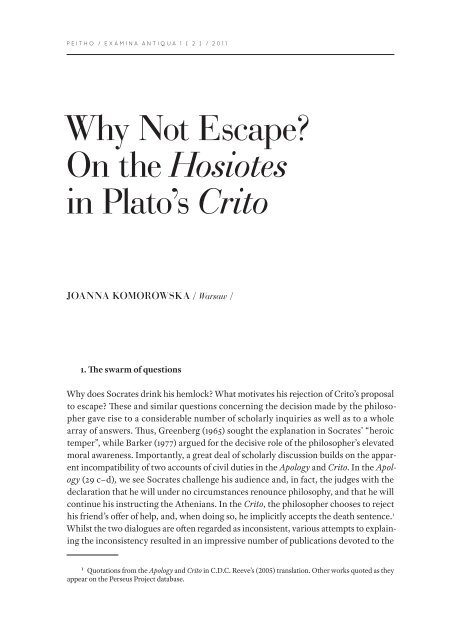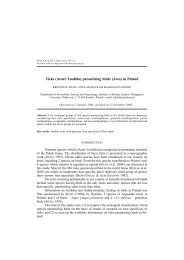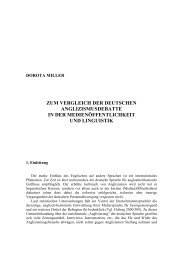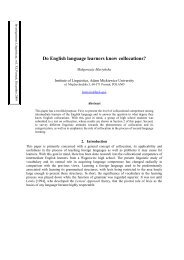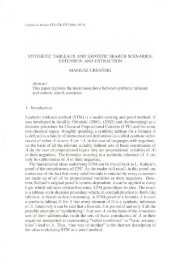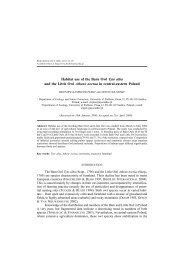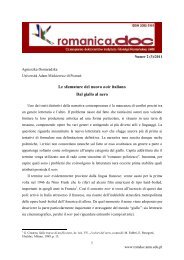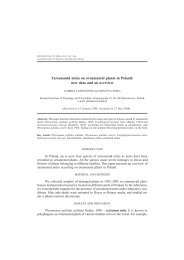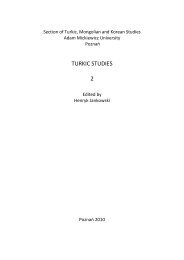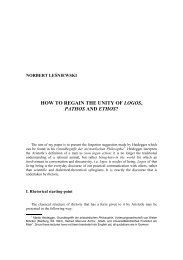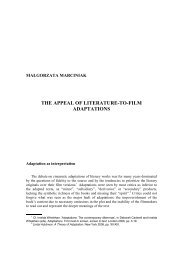Why Not Escape? On the Hosiotes in Plato's Crito - Peitho
Why Not Escape? On the Hosiotes in Plato's Crito - Peitho
Why Not Escape? On the Hosiotes in Plato's Crito - Peitho
Create successful ePaper yourself
Turn your PDF publications into a flip-book with our unique Google optimized e-Paper software.
PEITHO / EXAMINA ANTIQUA 1 ( 2 ) / 2011<br />
<strong>Why</strong> <strong>Not</strong> <strong>Escape</strong><br />
<strong>On</strong> <strong>the</strong> <strong>Hosiotes</strong><br />
<strong>in</strong> Plato’s <strong>Crito</strong><br />
JOANNA KOMOROWSKA / Warsaw /<br />
1. The swarm of questions<br />
<strong>Why</strong> does Socrates dr<strong>in</strong>k his hemlock What motivates his rejection of <strong>Crito</strong>’s proposal<br />
to escape These and similar questions concern<strong>in</strong>g <strong>the</strong> decision made by <strong>the</strong> philosopher<br />
gave rise to a considerable number of scholarly <strong>in</strong>quiries as well as to a whole<br />
array of answers. Thus, Greenberg (1965) sought <strong>the</strong> explanation <strong>in</strong> Socrates’ “heroic<br />
temper”, while Barker (1977) argued for <strong>the</strong> decisive role of <strong>the</strong> philosopher’s elevated<br />
moral awareness. Importantly, a great deal of scholarly discussion builds on <strong>the</strong> apparent<br />
<strong>in</strong>compatibility of two accounts of civil duties <strong>in</strong> <strong>the</strong> Apology and <strong>Crito</strong>. In <strong>the</strong> Apology<br />
(29 c–d), we see Socrates challenge his audience and, <strong>in</strong> fact, <strong>the</strong> judges with <strong>the</strong><br />
declaration that he will under no circumstances renounce philosophy, and that he will<br />
cont<strong>in</strong>ue his <strong>in</strong>struct<strong>in</strong>g <strong>the</strong> A<strong>the</strong>nians. In <strong>the</strong> <strong>Crito</strong>, <strong>the</strong> philosopher chooses to reject<br />
his friend’s offer of help, and, when do<strong>in</strong>g so, he implicitly accepts <strong>the</strong> death sentence. 1<br />
Whilst <strong>the</strong> two dialogues are often regarded as <strong>in</strong>consistent, various attempts to expla<strong>in</strong><strong>in</strong>g<br />
<strong>the</strong> <strong>in</strong>consistency resulted <strong>in</strong> an impressive number of publications devoted to <strong>the</strong><br />
1<br />
Quotations from <strong>the</strong> Apology and <strong>Crito</strong> <strong>in</strong> C.D.C. Reeve’s (2005) translation. O<strong>the</strong>r works quoted as <strong>the</strong>y<br />
appear on <strong>the</strong> Perseus Project database.
170 Joanna Komorowska / Warsaw /<br />
issue. 2 The present paper will seek to contribute to this l<strong>in</strong>e of <strong>in</strong>quiry. When try<strong>in</strong>g to<br />
ascerta<strong>in</strong> why Socrates chooses to die, <strong>the</strong> article will suggest that tak<strong>in</strong>g <strong>in</strong>to account<br />
<strong>the</strong> <strong>the</strong>n A<strong>the</strong>nian customs and rituals may contribute to a better understand<strong>in</strong>g of <strong>the</strong><br />
dialogue. My primary assumption, an assumption shared with many works on <strong>the</strong> <strong>Crito</strong>,<br />
is that <strong>the</strong> dialogue is naturally connected with <strong>the</strong> Apology and, (albeit possibly less<br />
closely), with <strong>the</strong> Euthyphro. 3 After all, Socrates’ death is, at least <strong>in</strong> <strong>Crito</strong>’s eyes, a “natural”,<br />
though avoidable, consequence of his trial.<br />
The context<br />
It seems ra<strong>the</strong>r uncontroversial to assume that <strong>the</strong> arguments <strong>in</strong> <strong>the</strong> <strong>Crito</strong> necessarily<br />
relate to those of <strong>the</strong> Apology. 4 We know that one of <strong>the</strong> two charges brought aga<strong>in</strong>st<br />
Socrates was that of ἀσέβεια (<strong>the</strong> philosopher does not revere <strong>the</strong> gods of <strong>the</strong> state). In<br />
sharp contrast to this, Socrates <strong>in</strong>sists dur<strong>in</strong>g his defense that all his philosophical activity<br />
was conducted <strong>in</strong> service to <strong>the</strong> Delphic god. Thus, he claims that it was a fulfillment<br />
of his div<strong>in</strong>ely sanctioned mission and, <strong>the</strong>reby, an act of piety. Hence, he purports not<br />
only that his philosophical activity was agreeable to <strong>the</strong> gods, but also that refra<strong>in</strong><strong>in</strong>g<br />
from it would have been tantamount to disobey<strong>in</strong>g <strong>the</strong> div<strong>in</strong>e command, and, <strong>the</strong>reby, to<br />
committ<strong>in</strong>g an act of impiety (this may constitute a l<strong>in</strong>k with <strong>the</strong> Euthyphro, a dialogue<br />
expressly deal<strong>in</strong>g with <strong>the</strong> nature of pious and impious acts).<br />
Consequently, <strong>in</strong> <strong>the</strong> Apology, Socrates’ persistent question<strong>in</strong>g of <strong>the</strong> established<br />
norms and his apparent disrespect for <strong>the</strong> A<strong>the</strong>nian authorities is portrayed as a div<strong>in</strong>e<br />
mission: it is supposed to constitute an act of utmost piety. 5 The question returns <strong>in</strong> <strong>the</strong><br />
<strong>Crito</strong>, <strong>the</strong> dialogue which <strong>in</strong> its own way may conta<strong>in</strong> an implicit answer to <strong>the</strong> fundamental<br />
question posed by <strong>the</strong> Euthyphro, but at <strong>the</strong> same time, responds to <strong>the</strong> charge<br />
leveled aga<strong>in</strong>st <strong>the</strong> philosopher. In a strik<strong>in</strong>g tour de force, Socrates’ rejection of <strong>Crito</strong>’s<br />
escape plan, a rejection which entails acceptance of <strong>the</strong> death sentence, becomes an act<br />
of piety and obedience to <strong>the</strong> πὰτριοι νόμοι, thus provid<strong>in</strong>g an implicit answer to <strong>the</strong><br />
dilemma of <strong>the</strong> Euthyphro.<br />
2<br />
The contribution by Kraut (1984) is probably <strong>the</strong> most important one.<br />
3<br />
I do not wish to regard <strong>the</strong> three as a cont<strong>in</strong>uous “story”, or to view <strong>the</strong> <strong>Crito</strong> as noth<strong>in</strong>g more than<br />
a follow-up on <strong>the</strong> Apology. The three dialogues are certa<strong>in</strong>ly l<strong>in</strong>ked by <strong>the</strong> sett<strong>in</strong>g (as far as <strong>the</strong>y deal with <strong>the</strong><br />
legal turmoil result<strong>in</strong>g <strong>in</strong> Socrates’ death); moreover, <strong>the</strong>y also share a deep concern for <strong>the</strong> issue of justice (as far<br />
as <strong>the</strong>y deal with <strong>the</strong> problem of just conduct, <strong>the</strong> relation between justice and piety, etc.). Yet, <strong>the</strong>y do not form<br />
a unified and cont<strong>in</strong>uous structure: <strong>the</strong>re are diverse subtle shifts <strong>in</strong> focus and numerous perplex<strong>in</strong>g discrepancies.<br />
Consequently, <strong>the</strong> three dialogues should ra<strong>the</strong>r be perceived as a trilogy ra<strong>the</strong>r than a unity.<br />
4<br />
There seems to be, however, an important po<strong>in</strong>t that separates Apology from all o<strong>the</strong>r dialogues: <strong>the</strong><br />
subject and <strong>the</strong> very mise en scene of <strong>the</strong> Apology are limited and def<strong>in</strong>ed by everyth<strong>in</strong>g that actually took place<br />
<strong>in</strong> <strong>the</strong> court. Thus, we may assume that <strong>the</strong> ma<strong>in</strong> features of Socrates’ speech reflect those of <strong>the</strong> actual apology.<br />
In <strong>the</strong> Euthyphro and <strong>Crito</strong>, on <strong>the</strong> o<strong>the</strong>r hand, <strong>the</strong> limitations are considerably fewer, and we may expect more<br />
creativity on Plato’s part.<br />
5<br />
The po<strong>in</strong>t is made repeatedly <strong>in</strong> <strong>the</strong> dialogue, most clearly <strong>in</strong> <strong>the</strong> already mentioned Apol. 29 c – d.
<strong>Why</strong> <strong>Not</strong> <strong>Escape</strong> <strong>On</strong> <strong>the</strong> <strong>Hosiotes</strong> <strong>in</strong> Plato’s <strong>Crito</strong><br />
171<br />
Even from a purely literary po<strong>in</strong>t of view, this is a masterly move, as <strong>the</strong> acceptance<br />
of <strong>the</strong> verdict underm<strong>in</strong>es its very foundation: Socrates’ death and his obedience to <strong>the</strong><br />
laws effectively undercuts <strong>the</strong> impiety charge. Also, it refutes <strong>the</strong> charge of corrupt<strong>in</strong>g<br />
<strong>the</strong> youth: while <strong>the</strong> philosopher dies <strong>in</strong> obedience to <strong>the</strong> verdict, he at <strong>the</strong> same time<br />
recognizes <strong>the</strong> authority of <strong>the</strong> A<strong>the</strong>nian <strong>in</strong>stitutions. When embrac<strong>in</strong>g death, Socrates<br />
appears to recognize a consummate obligation that b<strong>in</strong>ds him to <strong>the</strong> land and its gods.<br />
We shall return to this <strong>in</strong> <strong>the</strong> course of our fur<strong>the</strong>r considerations.<br />
The duties of an A<strong>the</strong>nian<br />
While Richard Kraut’s magisterial work Socrates and <strong>the</strong> State is clearly <strong>the</strong> most comprehensive<br />
treatment of <strong>the</strong> dialogue, it elies on several assumptions that can be challenged.<br />
Indeed, several important objections were raised by Bostock (2005: 221–223). As for<br />
myself, I would like to add two more reservations. First of all, Kraut’s treatment assumes<br />
that <strong>the</strong> lack of references to <strong>the</strong> ephebic oath before <strong>the</strong> fourth century BC entails that<br />
<strong>the</strong>re was no such th<strong>in</strong>g <strong>in</strong> Socrates’ youth, and thus that <strong>the</strong> word<strong>in</strong>g of <strong>the</strong> oath has<br />
no bear<strong>in</strong>g whatsoever on <strong>the</strong> argument conta<strong>in</strong>ed <strong>in</strong> <strong>the</strong> <strong>Crito</strong>. 6 The o<strong>the</strong>r assumption,<br />
a po<strong>in</strong>t well noted by Ober, concerns <strong>the</strong> identity of <strong>the</strong> Laws as <strong>the</strong>y appear to <strong>the</strong> philosopher:<br />
Kraut seems to reject <strong>the</strong> possibility that what we we are deal<strong>in</strong>g with here is an<br />
<strong>in</strong>carnation of <strong>the</strong> actual laws of A<strong>the</strong>ns, i.e. <strong>the</strong> result of 399 BC vote. 7<br />
As for <strong>the</strong> first assumption, even though we have no evidence to support a claim that<br />
<strong>the</strong> oath was necessarily functional at <strong>the</strong> time of Socrates’ death, one has to allow for<br />
<strong>the</strong> impact it might have had on <strong>the</strong> A<strong>the</strong>nian understand<strong>in</strong>g of <strong>the</strong> Platonic dialogue at<br />
<strong>the</strong> time of its composition. 8 Similarly, I assume that regardless of <strong>the</strong> exact time of its<br />
<strong>in</strong>troduction <strong>in</strong>to <strong>the</strong> A<strong>the</strong>nian usus, <strong>the</strong> oath specified <strong>the</strong> general expectations that <strong>the</strong><br />
political body of A<strong>the</strong>ns had of its members and that <strong>the</strong> image of citizen it promoted<br />
reflected <strong>the</strong> more general and widespread preconceptions of ‘a good A<strong>the</strong>nian’. 9 <strong>On</strong>e<br />
6<br />
Compare Kraut 1984: 152, n. 1.<br />
7<br />
<strong>On</strong> <strong>the</strong> issue see Ober 1998: 187, n. 59. Interest<strong>in</strong>gly, <strong>the</strong> issue attracted some attention <strong>in</strong> <strong>the</strong> work of<br />
Harte (2005), who noted that <strong>the</strong> identity of <strong>the</strong> Laws seems to fluctuate and change from <strong>the</strong> actual laws to <strong>the</strong><br />
more generalized, postulative entity. The issue at stake is complicated by <strong>the</strong> date of <strong>the</strong> dialogue: at <strong>the</strong> time of<br />
its composition, <strong>the</strong> πὰτριοι νὀμοι, i.e. <strong>the</strong> laws of A<strong>the</strong>ns would certa<strong>in</strong>ly be perceived as a specific code of law.<br />
8<br />
For a study of <strong>the</strong> presence of <strong>the</strong> oath <strong>in</strong> <strong>the</strong> fifth–century A<strong>the</strong>ns compare Siewert 1975. For a possible<br />
<strong>in</strong>fluence of <strong>the</strong> oath on <strong>the</strong> Platonic portrayal of <strong>the</strong> trial of Socrates (more precisely, on Apology 28 d 6–29 a 1)<br />
see Margalit F<strong>in</strong>kelberg’s Plato Apology 28d6–29a1 and <strong>the</strong> ephebic oath, of which an outl<strong>in</strong>e is available onl<strong>in</strong>e<br />
at <strong>the</strong> follow<strong>in</strong>g address: http://www.apaclassics.org/AnnualMeet<strong>in</strong>g/05mtg/abstracts/F<strong>in</strong>kelberg.html (accessed<br />
15 Nov. 2011).<br />
9<br />
Lycurgus’ Aga<strong>in</strong>st Leocrates provides us with an <strong>in</strong>terest<strong>in</strong>g passage: “It was for this reason, gentlemen<br />
of <strong>the</strong> jury, that all <strong>the</strong> Greeks exchanged this pledge at Plataea, before tak<strong>in</strong>g up <strong>the</strong>ir posts to fight aga<strong>in</strong>st <strong>the</strong><br />
power of Xerxes. The formula was not <strong>the</strong>ir own but borrowed from <strong>the</strong> oath which is traditional among you. It<br />
would be well for you to hear it; for though <strong>the</strong> events of that time are ancient history now we can discern clearly<br />
enough, <strong>in</strong> <strong>the</strong>se recorded words, <strong>the</strong> courage of our forbears” (80). Manifestly, <strong>the</strong> speaker relates <strong>the</strong> formula<br />
used <strong>in</strong> 479 BC to an ancient paradigm: surviv<strong>in</strong>g <strong>in</strong> <strong>the</strong> speech, <strong>the</strong> oath secures obedience to <strong>the</strong> leaders <strong>in</strong><br />
battle, steadfastness, piety and, <strong>in</strong>terest<strong>in</strong>gly, remembrance of <strong>the</strong> danger <strong>the</strong> barbarian threat posed to Greek
172 Joanna Komorowska / Warsaw /<br />
may also note that <strong>the</strong> political upheavals of <strong>the</strong> late fifth century, with <strong>the</strong> <strong>in</strong>troduction<br />
of <strong>the</strong> oligarchic rule and, even more importantly, with <strong>the</strong> oppression wrought by <strong>the</strong><br />
Sparta–sponsored tyrants, would have resulted <strong>in</strong> particularly pronounced emphasis on<br />
an image of model citizen: <strong>the</strong> review<strong>in</strong>g and promulgation of <strong>the</strong> A<strong>the</strong>nian law code at<br />
<strong>the</strong> very close of <strong>the</strong> century 10 <strong>in</strong>volved, after all, an immense effort of political and juridical<br />
reflection and one may imag<strong>in</strong>e that <strong>the</strong> process would be performed with <strong>the</strong> view<br />
to secur<strong>in</strong>g a well–function<strong>in</strong>g and stable political organism as well as with <strong>the</strong> view to<br />
<strong>in</strong>fluenc<strong>in</strong>g and shap<strong>in</strong>g <strong>the</strong> behavior of citizenry <strong>in</strong> an well–def<strong>in</strong>ed manner. To put it<br />
differently: any review and promulgation of <strong>the</strong> A<strong>the</strong>nian laws would be effective and,<br />
<strong>in</strong>deed, possible only if <strong>the</strong> politicians made several assumptions concern<strong>in</strong>g <strong>the</strong> citizenry,<br />
citizenship and, f<strong>in</strong>ally, <strong>the</strong> way a citizen behaves with respect to <strong>the</strong> πάτριος πολιτεία.<br />
It seems natural enough that issues such as rejection of λιποταξία, fidelity to <strong>the</strong> law and<br />
to <strong>the</strong> πολιτεία itself, or loyalty to γῆ πάτριος were <strong>in</strong>cluded <strong>in</strong> <strong>the</strong> promoted civic ideal.<br />
Fur<strong>the</strong>rmore, it seems reasonable to assume that this ideal would stand very much <strong>the</strong><br />
same throughout <strong>the</strong> Classical period.<br />
Now, <strong>the</strong> ephebic oath was handed down to us <strong>in</strong> <strong>the</strong> follow<strong>in</strong>g form: 11<br />
The ancestral oath of <strong>the</strong> ephebes, which <strong>the</strong> ephebes must swear. I shall not br<strong>in</strong>g shame upon<br />
<strong>the</strong> sacred weapons nor shall I desert <strong>the</strong> man beside me, wherever I stand <strong>in</strong> <strong>the</strong> l<strong>in</strong>e. I shall<br />
fight <strong>in</strong> defence of th<strong>in</strong>gs sacred and profane and I shall not hand <strong>the</strong> fa<strong>the</strong>rland on lessened,<br />
but greater and better both as far as I am able and with all. And I shall be obedient to whoever<br />
exercise power reasonable on any occasion and to <strong>the</strong> laws currently <strong>in</strong> force and any reasonable<br />
put <strong>in</strong>to force <strong>in</strong> future. If anyone destroys <strong>the</strong>se I shall not give <strong>the</strong>m allegiance both as<br />
far as is <strong>in</strong> my own power and <strong>in</strong> union with all, and I shall honour <strong>the</strong> ancestral religion.<br />
Witnesses: <strong>the</strong> Gods Aglaurus, Hestia, Enyo, Enyalios, Ares and A<strong>the</strong>na Areia, Zeus, Thallo,<br />
Auxo, Hegemone, Heracles, and <strong>the</strong> boundaries of my fa<strong>the</strong>rland, wheat, barley, v<strong>in</strong>es, olives, figs.<br />
The oath, <strong>in</strong>tended to preserve <strong>the</strong> democracy <strong>in</strong> its A<strong>the</strong>nian form and, naturally<br />
enough, to preserve <strong>the</strong> A<strong>the</strong>nian state itself, was sworn by male A<strong>the</strong>nians on <strong>the</strong> br<strong>in</strong>k<br />
of <strong>the</strong>ir adulthood and, as it is manifested by <strong>the</strong> word<strong>in</strong>g, spelled out <strong>the</strong> city’s expectations<br />
with respect to its citizen body and, by implication, <strong>the</strong> most basic duties a citizen<br />
had toward his πόλις. <strong>On</strong>e notes that <strong>the</strong> ideas conta<strong>in</strong>ed <strong>in</strong> its word<strong>in</strong>g are well attested<br />
<strong>in</strong> <strong>the</strong> fifth century literature 12 a circumstance manifest<strong>in</strong>g <strong>the</strong> essential universality of<br />
freedom. Clearly, <strong>the</strong> provisions secur<strong>in</strong>g steadfastness <strong>in</strong> battles and observance of burial (and hence, religious)<br />
customs rema<strong>in</strong> of paramount <strong>in</strong>terest at that po<strong>in</strong>t, as does <strong>the</strong> very fact that Lycurgus <strong>in</strong>vokes someth<strong>in</strong>g like<br />
an established custom.<br />
10<br />
<strong>On</strong> <strong>the</strong> 410–399 BC revision compare Hansen 1999: 172–175 and, briefly, Ober 1998: 186–187.<br />
11<br />
The text is quoted as it appears <strong>in</strong> P.J. Rhodes and Rob<strong>in</strong> Osborne, Greek Historical Inscriptions<br />
404–323 BC (Oxford, 2007). For a discussion of <strong>the</strong> text see also Siewert 1977.<br />
12<br />
An echo of <strong>the</strong> concept of λιποταξία as failure to comply with one’s duties to <strong>the</strong> πόλις appears <strong>in</strong> <strong>the</strong><br />
Euripidean Phoenissae 991–1005 and Erech<strong>the</strong>us f. 360 Cropp. The idea that a true citizen takes an active <strong>in</strong>terest<br />
<strong>in</strong> <strong>the</strong> concerns of <strong>the</strong> city goes back to <strong>the</strong> Solonic law (with regard to latter compare <strong>the</strong> recent discussion of<br />
Van’t Wont) and is manifestly present <strong>in</strong> Periclean epitaph (Thuc. II 37), while an acute rejection of those who
<strong>Why</strong> <strong>Not</strong> <strong>Escape</strong> <strong>On</strong> <strong>the</strong> <strong>Hosiotes</strong> <strong>in</strong> Plato’s <strong>Crito</strong><br />
173<br />
<strong>the</strong> formula. Indeed, even if <strong>the</strong> actual oath was unknown earlier, its word<strong>in</strong>g reflects<br />
someth<strong>in</strong>g of <strong>the</strong> deeply felt attachment to <strong>the</strong> <strong>in</strong>herited tradition, to <strong>the</strong> land and its<br />
νόμοι so famously applauded <strong>in</strong> <strong>the</strong> funerary speech of Pericles when speak<strong>in</strong>g <strong>in</strong> honor<br />
of <strong>the</strong> fallen dur<strong>in</strong>g <strong>the</strong> first year of <strong>the</strong> Peloponnesian war. 13 <strong>On</strong>e should remember that<br />
<strong>the</strong> very sentiment that every citizen should strive to preserve and uphold <strong>the</strong> democratic<br />
rule had motivated <strong>the</strong> <strong>in</strong>troduction of <strong>the</strong> ὀστρακισμός, an <strong>in</strong>stitution designed with<br />
a view to secur<strong>in</strong>g <strong>the</strong> stability of <strong>the</strong> A<strong>the</strong>nian πολιτεία. Also, a promotion of active or<br />
conscious citizenship understood as responsibility toward <strong>the</strong> πόλις ra<strong>the</strong>r than any o<strong>the</strong>r<br />
nuclear entity is quite likely to figure among <strong>the</strong> reasons motivat<strong>in</strong>g <strong>the</strong> Kleis<strong>the</strong>nian<br />
division of φυλαί. Equally importantly, Solon, often considered to be <strong>the</strong> found<strong>in</strong>g fa<strong>the</strong>r<br />
of <strong>the</strong> A<strong>the</strong>nian πολιτεία, emphasized <strong>the</strong> importance of civil <strong>in</strong>terest <strong>in</strong> <strong>the</strong> communal<br />
(political) welfare when bann<strong>in</strong>g neutrality <strong>in</strong> case of civil war: a citizen must take <strong>in</strong>terest<br />
<strong>in</strong> <strong>the</strong> matters affect<strong>in</strong>g <strong>the</strong>ir πόλις. 14 Indeed, even if we admit that <strong>the</strong> oath as it is<br />
known from <strong>the</strong> Acharnian <strong>in</strong>scription was absent from <strong>the</strong> earlier political sphere, we<br />
are far from lack<strong>in</strong>g evidence that it describes <strong>the</strong> civic ideal well known <strong>in</strong> <strong>the</strong> earlier<br />
epoch. Moreover, even if we reject <strong>the</strong> idea of its earlier <strong>in</strong>troduction, it is still tempt<strong>in</strong>g<br />
to l<strong>in</strong>k <strong>the</strong> emergence of its canonized form <strong>in</strong>to <strong>the</strong> A<strong>the</strong>nian public life with <strong>the</strong> rewrit<strong>in</strong>g<br />
of <strong>the</strong> law code. Thus understood, <strong>the</strong> oath becomes a visible symbol of <strong>the</strong> renewed<br />
order of <strong>the</strong> polis and democracy resurrected after <strong>the</strong> fall of <strong>the</strong> Thirty.<br />
The lawful verdict<br />
What we have to understand is that Socrates, as portrayed <strong>in</strong> <strong>Crito</strong>, has been sentenced to<br />
death <strong>in</strong> <strong>the</strong> formal court of law, <strong>the</strong> verdict supported by <strong>the</strong> vast majority of <strong>the</strong> chosen<br />
jurors. Hence, <strong>in</strong> <strong>the</strong> eyes of <strong>the</strong> law, as it governs <strong>the</strong> A<strong>the</strong>nian state and as it has been<br />
accepted by <strong>the</strong> citizen body, he did deserve <strong>the</strong> punishment. Fur<strong>the</strong>rmore, he failed to<br />
persuade <strong>the</strong> court that his guilt could be assuaged by anyth<strong>in</strong>g less severe than <strong>the</strong> capital<br />
punishment. The lawful verdict has been returned and he is about to die. There is noth<strong>in</strong>g<br />
to save him, except for <strong>the</strong> escape, <strong>the</strong> possibility of <strong>the</strong> latter be<strong>in</strong>g arranged by his<br />
friends and <strong>in</strong>volv<strong>in</strong>g, as it stands, an act of corrupt<strong>in</strong>g a public servant. As <strong>Crito</strong> strives<br />
to persuade Socrates to choose <strong>the</strong> latter solution, and as <strong>the</strong> philosopher attempts to<br />
transgressed aga<strong>in</strong>st <strong>the</strong> state is mirrored <strong>in</strong> <strong>the</strong> fate of Megacles’ party as described by Plutarch (Solon XII 4).<br />
For <strong>the</strong> loyalty to <strong>the</strong> legal order of <strong>the</strong> city see <strong>the</strong> <strong>in</strong>sightful comment of Gagar<strong>in</strong> (1986: 80): “[…] <strong>the</strong> very<br />
fact of enact<strong>in</strong>g a set of laws for a particular polis would enforce <strong>the</strong> idea that those who belonged to that polis<br />
were specially characterized by an obligation to obey those laws as well as by a claim on <strong>the</strong> protection offered<br />
by <strong>the</strong>m.”<br />
13<br />
Compare Thuc. II 37.<br />
14<br />
<strong>On</strong> <strong>the</strong> rule, compare Plu., Solon, 20. Characteristically, <strong>the</strong> communal, or political reasons underly<strong>in</strong>g<br />
<strong>the</strong> norm do not go unnoticed by <strong>the</strong> Cheronean, who notes: “He wishes, probably, that a man should not be<br />
<strong>in</strong>sensible or <strong>in</strong>different to <strong>the</strong> common weal, arrang<strong>in</strong>g his private affairs securely and glory<strong>in</strong>g <strong>in</strong> <strong>the</strong> fact that<br />
he has no share <strong>in</strong> <strong>the</strong> distempers and distresses of his country, but should ra<strong>the</strong>r espouse promptly <strong>the</strong> better and<br />
more righteous cause, share its perils and give it his aid, <strong>in</strong>stead of wait<strong>in</strong>g <strong>in</strong> safety to see which cause prevails.”
174 Joanna Komorowska / Warsaw /<br />
persuade his friend to desist from his quest, <strong>the</strong> discussion turns <strong>in</strong>evitably to <strong>the</strong> important<br />
issues of justice, lawfulness, legal order, and to <strong>the</strong> relation between a man and <strong>the</strong>ir<br />
community. Due to <strong>the</strong> peculiarities of <strong>the</strong> sett<strong>in</strong>g, it becomes a debate which contrasts<br />
self-preservation and uphold<strong>in</strong>g of <strong>the</strong> law, <strong>the</strong> contrast<strong>in</strong>g expectations which a household<br />
and <strong>the</strong> community have with regard to an <strong>in</strong>dividual. 15 And it is <strong>in</strong>to this debate<br />
that Socrates <strong>in</strong>troduces <strong>the</strong> Laws <strong>the</strong>mselves, <strong>the</strong> Laws ‘as <strong>the</strong>y are’, <strong>in</strong>deed, <strong>the</strong> Laws<br />
as <strong>the</strong>se are to be obeyed by every A<strong>the</strong>nian citizen, <strong>the</strong> contract cemented by an oath, 16<br />
with its <strong>in</strong>herent formula: And I shall be obedient […] to <strong>the</strong> laws currently <strong>in</strong> force and any<br />
reasonable put <strong>in</strong>to force <strong>in</strong> future. 17 To escape obedience of a legal norm and to rema<strong>in</strong><br />
a model citizen an <strong>in</strong>dividual would ei<strong>the</strong>r have to try and change <strong>the</strong> norm <strong>in</strong> question<br />
or, <strong>in</strong> cases pos<strong>in</strong>g a particular danger to <strong>the</strong> community, to try and abolish <strong>the</strong> contested<br />
degree (as <strong>in</strong> a γραφὴ παρανόμων case). 18 And one has to remember that A<strong>the</strong>ns were not<br />
adverse to change, provided it could be persuasively defended: <strong>the</strong>re was an established<br />
review process, <strong>in</strong>tended to secure <strong>the</strong> renewal and <strong>the</strong> effectiveness of <strong>the</strong> legal system,<br />
while considerable care was exercised when secur<strong>in</strong>g <strong>the</strong> official and <strong>in</strong>tr<strong>in</strong>sically legal<br />
ways <strong>in</strong> which an <strong>in</strong>dividual could contest <strong>the</strong> law, he deemed damag<strong>in</strong>g or unjust. And<br />
by <strong>the</strong> A<strong>the</strong>nian standards, if such a claimant failed to achieve his objective (i.e. failed to<br />
persuade <strong>the</strong> assembly about <strong>the</strong> unjust, damag<strong>in</strong>g or corruptive nature of <strong>the</strong> given legal<br />
norm), <strong>the</strong>n he had to conform to <strong>the</strong> exist<strong>in</strong>g legal order.<br />
For <strong>Crito</strong>, as for many, it is <strong>the</strong> justice of <strong>the</strong> verdict that counts. Consider<strong>in</strong>g <strong>the</strong><br />
sentence to be substantially wrong, he is <strong>in</strong>cl<strong>in</strong>ed to ignore its formal validity and argues<br />
for Socrates’ escape as for a perfectly justified option (this, however, means that he<br />
accepts <strong>the</strong> pr<strong>in</strong>ciple effectively rejected by Socrates, i.e. he assumes that act<strong>in</strong>g unjustly<br />
is justified if one is act<strong>in</strong>g <strong>in</strong> response to some <strong>in</strong>justice 19 ). For Socrates’ embodied<br />
Laws (regardless of <strong>the</strong> problem concern<strong>in</strong>g <strong>the</strong> identity of <strong>the</strong>ir views with those of <strong>the</strong><br />
philosopher, or, for that matter, of <strong>the</strong> fact that <strong>the</strong> Laws would probably be <strong>in</strong> agreement<br />
15<br />
These peculiarities are well stressed by Ober (1998: 179) who duly emphasizes <strong>the</strong> f<strong>in</strong>ality of <strong>the</strong> choice<br />
(<strong>the</strong> discussion cannot be repeated at ano<strong>the</strong>r time), and also pays some attention to <strong>the</strong> impact of <strong>the</strong> physical<br />
sett<strong>in</strong>g of <strong>the</strong> scene, located with<strong>in</strong> <strong>the</strong> conf<strong>in</strong>es of <strong>the</strong> “public place” (to demosion, i.e. prison).<br />
16<br />
It was certa<strong>in</strong>ly streng<strong>the</strong>ned by <strong>the</strong> oath <strong>in</strong> <strong>the</strong> times of Lycurgus, who could proudly claim <strong>in</strong> his Aga<strong>in</strong>st<br />
Leocrates: The power which keeps our democracy toge<strong>the</strong>r is <strong>the</strong> oath (79). His prosecution of Leocrates reflects<br />
<strong>the</strong> pro–civic ideology of his times, and openly supports <strong>the</strong> belief that citizen’s duty toward his country is to<br />
be considered sacred and, moreover, that <strong>the</strong> welfare of <strong>the</strong> political community is dependent on <strong>the</strong> effort of<br />
every s<strong>in</strong>gle member.<br />
17<br />
<strong>On</strong>e notes that <strong>the</strong> custom of confirm<strong>in</strong>g <strong>the</strong> legal constitution of A<strong>the</strong>ns with an oath dates back to <strong>the</strong><br />
Solonian constitution, compare Arist. Const. Ath. 7: “he established a constitution and made o<strong>the</strong>r laws, and<br />
<strong>the</strong>y ceased to observe <strong>the</strong> ord<strong>in</strong>ances of Draco, except those relat<strong>in</strong>g to homicide. They wrote up <strong>the</strong> laws on<br />
<strong>the</strong> Boards and set <strong>the</strong>m <strong>in</strong> <strong>the</strong> Royal Colonnade, and all swore to observe <strong>the</strong>m.”<br />
18<br />
Compare Ober 1988: 186–187, Hansen 1990: 171–185. A process by which a law was officially challenged<br />
is described by Demos<strong>the</strong>nes (24. 20–23).<br />
19<br />
An additional complication may be related to <strong>the</strong> fact that Socrates’ choice would be made on deliberation:<br />
while act<strong>in</strong>g unjustly under <strong>the</strong> onslaught of an emotion (particularly anger) would be regarded as understandable<br />
even if <strong>in</strong>considerate (<strong>in</strong>deed, it is generally thought that anger forms a natural response to what is<br />
perceived as unjust), committ<strong>in</strong>g an <strong>in</strong>justice upon deliberation is far from acceptable throughout Greek history<br />
(on <strong>the</strong> issue compare Konstan 2006: 41–77 and Harris 2002: 339–362.
<strong>Why</strong> <strong>Not</strong> <strong>Escape</strong> <strong>On</strong> <strong>the</strong> <strong>Hosiotes</strong> <strong>in</strong> Plato’s <strong>Crito</strong><br />
175<br />
with <strong>Crito</strong> as far as <strong>the</strong> limited ban on wrongdo<strong>in</strong>g is concerned 20 ), <strong>the</strong> situation is vastly<br />
different: s<strong>in</strong>ce <strong>the</strong> formal requirements have been satisfied, <strong>the</strong>y argue <strong>in</strong> favor of suffer<strong>in</strong>g<br />
<strong>the</strong> imposed penalty. In defense of <strong>the</strong>ir stand, <strong>the</strong>y <strong>in</strong>voke <strong>the</strong> so called contractual<br />
argument, emphasiz<strong>in</strong>g <strong>the</strong> claim a πόλις has over its citizen who was effectively reared<br />
and nurtured with<strong>in</strong> <strong>the</strong> framework of its political and legal order. 21 Also, <strong>the</strong>y <strong>in</strong>voke <strong>the</strong><br />
consensual argument: by choos<strong>in</strong>g not to leave A<strong>the</strong>ns and to conduct all his bus<strong>in</strong>ess <strong>in</strong><br />
<strong>the</strong> city Socrates agreed to uphold <strong>the</strong> legal order of his πόλις. Moreover, he had his sons<br />
brought up <strong>in</strong> <strong>the</strong> same political milieu, thus, proclaim<strong>in</strong>g his approval of <strong>the</strong> respective<br />
πολιτεία. In choos<strong>in</strong>g to escape, he will effectively renege on his prior assent, implicitly<br />
reject<strong>in</strong>g <strong>the</strong> validity of <strong>the</strong> political order he manifestly embraced throughout his life, an<br />
act constitut<strong>in</strong>g a breach of <strong>the</strong> universally acknowledged bond between a citizen and its<br />
city. Viewed aga<strong>in</strong>st <strong>the</strong> mirror of <strong>the</strong> fifth century literature, an <strong>in</strong>dividual act<strong>in</strong>g on an<br />
unshakeable belief <strong>in</strong> his righteousness and proclaim<strong>in</strong>g himself exempt from <strong>the</strong> rule of<br />
<strong>the</strong> law because of <strong>the</strong> alleged superiority of his understand<strong>in</strong>g rema<strong>in</strong>s not only a highly<br />
problematic figure, but also a challenge to <strong>the</strong> democratic system, and, possibly, a threat<br />
to <strong>the</strong> society that breeds him. 22<br />
The tragic l<strong>in</strong>k<br />
We know Plato to have been well acqua<strong>in</strong>ted with <strong>the</strong> <strong>the</strong>n tragic literature – several<br />
of his dialogues rema<strong>in</strong> deeply <strong>in</strong>debted to <strong>the</strong> Euripidean drama: 23 perhaps it would<br />
be worthwhile to consider <strong>the</strong> possibility that both Socrates and Plato take a stand<br />
<strong>in</strong> a political debate manifest<strong>in</strong>g itself <strong>in</strong> tragedy. 24 This entails consider<strong>in</strong>g <strong>the</strong> <strong>Crito</strong><br />
aga<strong>in</strong>st <strong>the</strong> mirror of <strong>the</strong> Sophoclean drama and compar<strong>in</strong>g Socrates with a heroic<br />
protagonist of Antigone’s type: a person whose sense of rightness <strong>in</strong>duces her or him<br />
to challenge <strong>the</strong> acknowledged legal order. 25 The Sophoclean hero, stand<strong>in</strong>g to some<br />
20<br />
<strong>On</strong> <strong>the</strong> issue compare Harte 2005. It is worth emphasiz<strong>in</strong>g that I share Harte’s reservations concern<strong>in</strong>g<br />
<strong>the</strong> genu<strong>in</strong>eness of <strong>the</strong> Laws’ speech – it is at best risky to assume that <strong>the</strong>ir speech reflects Socrates’ own views<br />
merely on <strong>the</strong> grounds of his hav<strong>in</strong>g <strong>in</strong>troduced <strong>the</strong> Laws <strong>in</strong>to his considerations.<br />
21<br />
S<strong>in</strong>ce <strong>the</strong> <strong>in</strong>tricacies of <strong>the</strong> argument were discussed by Kraut (1984: 115–148) it seems hardly necessary<br />
to <strong>in</strong>dulge <strong>in</strong> a similar discussion at this po<strong>in</strong>t.<br />
22<br />
Knox (1964) rema<strong>in</strong>s a fundamental work on <strong>the</strong> problem. His emphasis is on Sophocles and <strong>the</strong> unbend<strong>in</strong>g<br />
character of <strong>the</strong> latter’s heroes; yet, it is easy to understand that moral superiority would always rema<strong>in</strong><br />
a problem <strong>in</strong> a city which claimed to rely on <strong>the</strong> will of <strong>the</strong> many.<br />
23<br />
The dependence is particularly pronounced <strong>in</strong> <strong>the</strong> Gorgias (on <strong>the</strong> issue compare Night<strong>in</strong>gale 1992), but<br />
transtextual references are not uncommon <strong>in</strong> <strong>the</strong> o<strong>the</strong>r dialogues.<br />
24<br />
The possibility is emphasized by <strong>the</strong> Laws’ description of <strong>the</strong> evil of exile, a description mak<strong>in</strong>g a considerable<br />
use of a number of topoi attested <strong>in</strong> <strong>the</strong> fifth century literary work. Thus, <strong>the</strong> image of exile as tantamount<br />
to slavery (53 e: live by curry<strong>in</strong>g favor with every man and act<strong>in</strong>g <strong>the</strong> slave) revokes Polyneices’ description<br />
of his fate <strong>in</strong> <strong>the</strong> Euripidean Phoenissae 389–407. Characteristically, los<strong>in</strong>g freedom of speech (parrhesia)<br />
is mentioned as <strong>the</strong> very worst consequence of an exile (Pho. 391) and, subsequently, as a feature of slavery<br />
(by Jocaste <strong>in</strong> v. 392).<br />
25<br />
<strong>On</strong>e has to remember that <strong>the</strong> prohibition of a burial as applied to deceased traitors was not unknown <strong>in</strong><br />
A<strong>the</strong>ns. In fact, it formed a recognized practice (one may mention <strong>the</strong> fate of Megacles’ followers, as described
176 Joanna Komorowska / Warsaw /<br />
extent apart from <strong>the</strong> masses, rema<strong>in</strong>s a law unto himself: his unyield<strong>in</strong>g ma<strong>in</strong>tenance<br />
of <strong>the</strong> norms he considers superior to any edict promulgated by man creates a crisis that<br />
ultimately destroys him or herself and deeply affects <strong>the</strong> community concerned. In <strong>the</strong><br />
essence, however, such a hero is unable to act <strong>in</strong> any o<strong>the</strong>r way: Ajax, as long as he is<br />
Ajax, cannot accept <strong>the</strong> unanimous verdict of <strong>the</strong> army, whereas Antigone, be<strong>in</strong>g Antigone,<br />
cannot yield to Creon’s demands. The very <strong>in</strong>flexibility of <strong>the</strong>ir moral stand is an<br />
element mirrored <strong>in</strong> Socrates’ adamant uphold<strong>in</strong>g of <strong>the</strong> choices he has made <strong>in</strong> his life,<br />
such as, to adduce <strong>the</strong> possibly most famous example, his refusal to obey <strong>the</strong> court should<br />
<strong>the</strong> latter acquit <strong>the</strong> philosopher, but made <strong>the</strong> acquittal dependent on his renounc<strong>in</strong>g<br />
<strong>the</strong> practice of ἔλεγχος (Pl. Ap. 29 c–30 c). Yet, symptomatically, his decision is made<br />
(unlike those <strong>in</strong> <strong>the</strong> Sophoclean drama) with a view toward <strong>the</strong> good of <strong>the</strong> community,<br />
<strong>in</strong>deed, with a view of ‘mak<strong>in</strong>g people better’. Thus, <strong>the</strong> important po<strong>in</strong>t is that unlike<br />
<strong>the</strong> Ajaxes or Heracleses, Socrates chooses to destroy himself ra<strong>the</strong>r than <strong>the</strong> norm and<br />
<strong>the</strong> polis, and. Thus, his act of heroic defiance leads him to stand by <strong>the</strong> legal order of <strong>the</strong><br />
city (or, depend<strong>in</strong>g on <strong>the</strong> read<strong>in</strong>g, by his own moral ideal) even as <strong>the</strong> decisions of <strong>the</strong><br />
latter prove to be his undo<strong>in</strong>g. 26<br />
This, however, is not all: his hypo<strong>the</strong>tical defection could wreck <strong>the</strong> city, as it would<br />
provide an example of one who deems himself above <strong>the</strong> law, or at <strong>the</strong> very best, an<br />
example of one who refuses to recognize <strong>the</strong> authority of a lawfully passed sentence. 27<br />
This is not a mere detail, even if we agree that <strong>the</strong> city will not suffer damage unless<br />
a notably larger number of citizens choose to disregard its legal order. 28 Still, we do know,<br />
for Socrates is quite emphatic on this po<strong>in</strong>t both <strong>in</strong> <strong>the</strong> Apology and <strong>in</strong> <strong>the</strong> <strong>Crito</strong>, that<br />
his whole adult life was dedicated to educat<strong>in</strong>g <strong>the</strong> A<strong>the</strong>nians. 29 This education was<br />
his div<strong>in</strong>ely orda<strong>in</strong>ed mission, an act of deep piety – both with regard to his homeland,<br />
which he sought to make better (as it was a duty of every citizen, as clearly stated <strong>in</strong> <strong>the</strong><br />
surviv<strong>in</strong>g text of <strong>the</strong> oath), and with regard to <strong>the</strong> gods, on whose authority he was act<strong>in</strong>g<br />
(<strong>in</strong> conformity with <strong>the</strong> ‘honour <strong>the</strong> ancestral religion’ postulate). Ironically, <strong>the</strong> quest<br />
resulted <strong>in</strong> <strong>the</strong> impiety charge. Yet, <strong>the</strong> question seems to be, whe<strong>the</strong>r enouncement of<br />
<strong>the</strong> law (as manifested by reject<strong>in</strong>g <strong>the</strong> death sentence) would contribute to a Verbesserung<br />
of <strong>the</strong> πόλις and its citizenry. This is an important po<strong>in</strong>t, for it seems that Socrates<br />
by Plu., Solon, XII, 4). Hence, it is ra<strong>the</strong>r Antigone’s refusal to conform to <strong>the</strong> norm that stands out <strong>in</strong> <strong>the</strong> play.<br />
26<br />
In essence, nei<strong>the</strong>r Antigone nor Ajax recognizes <strong>the</strong> authority of decisions <strong>the</strong>y consider unjust: meanwhile,<br />
Socrates seems to recognize <strong>the</strong> legality and <strong>the</strong> authority of <strong>the</strong> sentence even if he considers it unjust<br />
(which is also true of his personified Laws).<br />
27<br />
Now, one has to appreciate <strong>the</strong> weight of this possibility: <strong>the</strong> person most famously believed to be exempt<br />
from <strong>the</strong> legal order of his own country is <strong>the</strong> Persian k<strong>in</strong>g (as portrayed <strong>in</strong> <strong>the</strong> Aeschylean Persae).<br />
28<br />
It is <strong>in</strong> this respect that one has to consider <strong>the</strong> possibility that <strong>in</strong> escap<strong>in</strong>g, Socrates will do ‘his utmost’<br />
to harm <strong>the</strong> city, that <strong>the</strong> damage to <strong>the</strong> legal order will be such as it is <strong>in</strong> his power to <strong>in</strong>flict – a po<strong>in</strong>t highlighted<br />
by Barker (1977) that br<strong>in</strong>gs to m<strong>in</strong>d <strong>the</strong> formula used, albeit <strong>in</strong> reference to military effort, by Lycurgus,<br />
<strong>in</strong> Leocr., 63–64.<br />
29<br />
Indeed, <strong>in</strong> <strong>the</strong> Apology he refuses to desist from his striv<strong>in</strong>gs even if such a renouncement were to guarantee<br />
his be<strong>in</strong>g acquitted (one has to remember, however, that his declaration is rendered empty by <strong>the</strong> <strong>in</strong>tricacies<br />
of <strong>the</strong> A<strong>the</strong>nian court system: <strong>the</strong>re is no possibility of one be<strong>in</strong>g released from charges brought aga<strong>in</strong>st him on<br />
<strong>the</strong> condition of an appropriate behavior <strong>in</strong> <strong>the</strong> future, a po<strong>in</strong>t rightly stressed by Kraut 1984: 13–17).
<strong>Why</strong> <strong>Not</strong> <strong>Escape</strong> <strong>On</strong> <strong>the</strong> <strong>Hosiotes</strong> <strong>in</strong> Plato’s <strong>Crito</strong><br />
177<br />
strives to persuade <strong>Crito</strong> that his death is an act of piety on par with his past search for<br />
<strong>the</strong> sage and <strong>the</strong> ἔλεγχος practice. As it was <strong>in</strong> <strong>the</strong> case of <strong>the</strong> impiety charge, <strong>the</strong>re is<br />
a profound irony to <strong>the</strong> issue: contrary to every expectation <strong>the</strong> polis stands to ga<strong>in</strong> by<br />
loos<strong>in</strong>g Socrates, not by keep<strong>in</strong>g him alive (which seems to be his po<strong>in</strong>t <strong>in</strong> <strong>the</strong> Apology). 30<br />
Similar irony underlies <strong>the</strong> circumstance mentioned by <strong>the</strong> Laws <strong>the</strong>mselves: any attempt<br />
to avoid <strong>the</strong> sentence once it has been passed (its justice, one should remember, is not at<br />
issue – <strong>the</strong> Laws actually admit that <strong>the</strong> guilty verdict was materially unjust) will effectively<br />
furnish an <strong>in</strong>contestable proof of Socrates’ guilt. 31<br />
At this po<strong>in</strong>t, it might be useful to <strong>in</strong>voke <strong>the</strong> pr<strong>in</strong>cipal issue of <strong>the</strong> Euthyphro, <strong>the</strong><br />
dialogue that leads <strong>the</strong> two participants <strong>in</strong>to massive disagreement on <strong>the</strong> subject of piety.<br />
But is it only piety that is at stake Euthyphro reports his fa<strong>the</strong>r because of this latter’s<br />
responsibility for a slave’s death (actually for a murderous slave’s death). Be<strong>in</strong>g left to<br />
starve, bound and at <strong>the</strong> mercy of <strong>the</strong> elements, <strong>the</strong> slave died <strong>in</strong> circumstances strik<strong>in</strong>gly<br />
redolent of <strong>the</strong> A<strong>the</strong>nian apotympanismos, 32 suggest<strong>in</strong>g that <strong>the</strong> issue at stake might be<br />
<strong>the</strong> neglect of <strong>the</strong> legal process when met<strong>in</strong>g out <strong>the</strong> punishment. 33 Thus, <strong>the</strong> dialogue<br />
highlights certa<strong>in</strong> complications <strong>in</strong>tr<strong>in</strong>sic <strong>in</strong> a legal system, a system <strong>in</strong> which what is<br />
lawful <strong>in</strong>terferes with what is just. Euthyphro’s actions are surely lawful: <strong>the</strong> problem is<br />
how <strong>the</strong>y can be just, if, at <strong>the</strong> same time, <strong>the</strong>y effectively violate <strong>the</strong> common assumptions<br />
concern<strong>in</strong>g <strong>the</strong> fa<strong>the</strong>r–son relationship. The latter is an <strong>in</strong>terest<strong>in</strong>g po<strong>in</strong>t, for <strong>the</strong><br />
Laws will <strong>in</strong>voke <strong>the</strong> very relationship <strong>in</strong> <strong>the</strong>ir address to Socrates <strong>in</strong> <strong>the</strong> <strong>Crito</strong>. 34 Yet,<br />
while <strong>the</strong> po<strong>in</strong>t is worth discuss<strong>in</strong>g, such a discussion will have to be postponed: for now<br />
it suffices to note that <strong>the</strong> legal vs. just debate reverberates throughout <strong>the</strong> three dialogues,<br />
<strong>the</strong> conflict<strong>in</strong>g obligations be<strong>in</strong>g of paramount importance for <strong>the</strong>ir respective debates.<br />
Also, <strong>the</strong> Euthyphro <strong>in</strong>troduces <strong>the</strong> religiosity <strong>the</strong>me: what may be termed religio legis <strong>in</strong><br />
<strong>the</strong> <strong>Crito</strong> was effectively foreshadowed by <strong>the</strong> religio deorum undercurrent <strong>in</strong> both <strong>the</strong><br />
Apology and <strong>the</strong> Euthyphro.<br />
30<br />
To this one could add ano<strong>the</strong>r po<strong>in</strong>t: <strong>in</strong> <strong>the</strong> Apology Socrates attaches a considerable importance to <strong>the</strong><br />
sudden silence of his δαιμόνιον, <strong>the</strong> <strong>in</strong>ternal voice that used to keep him from any harm (<strong>in</strong> <strong>the</strong> sense of “harm<br />
for Socrates himself ”, i.e. his committ<strong>in</strong>g <strong>in</strong>justice). By contrast, he emphasizes <strong>the</strong> div<strong>in</strong>ity of <strong>the</strong> ‘elenchus’<br />
command, <strong>the</strong> part played by a deity <strong>in</strong> life–choices. This may lead one to consider <strong>the</strong> guilty verdict as be<strong>in</strong>g to<br />
some extent a part of <strong>the</strong> universal pattern of th<strong>in</strong>gs, to be judged by gods alone. In such a case, <strong>the</strong> personified<br />
Laws may be taken to be a manifestation of a daimonic voice (after all, <strong>the</strong>ir <strong>in</strong>tervention is negative one, for <strong>the</strong>y<br />
aim to prevent Socrates from do<strong>in</strong>g someth<strong>in</strong>g ra<strong>the</strong>r than to persuade him to do someth<strong>in</strong>g), hence <strong>the</strong> voice<br />
warn<strong>in</strong>g Socrates away from a possible <strong>in</strong>justice (a possibility streng<strong>the</strong>ned once we consider <strong>the</strong> word<strong>in</strong>g of<br />
<strong>Crito</strong> 54 d: “this is what I seem to hear, as <strong>the</strong> frenzied dervishes of Cybele seem to hear <strong>the</strong> flutes, and this sound<br />
of <strong>the</strong>se words re–echoes with<strong>in</strong> me and prevents my hear<strong>in</strong>g any o<strong>the</strong>r words”), and death comes as a cont<strong>in</strong>uance<br />
of a duty imposed by Apollo <strong>in</strong> Delphi.<br />
31<br />
Pl. <strong>Crito</strong> 53 b–c: “You will also confirm your jurors <strong>in</strong> <strong>the</strong>ir op<strong>in</strong>ion, so that <strong>the</strong>y will th<strong>in</strong>k <strong>the</strong>y judged<br />
your lawsuit correctly. For anyone who underm<strong>in</strong>es laws might very well be considered a corruptor of young<br />
and ignorant people.” In a way, <strong>the</strong> reference to someth<strong>in</strong>g like ‘<strong>the</strong> general op<strong>in</strong>ion’ or ‘people’s op<strong>in</strong>ion’ mirrors<br />
<strong>Crito</strong>’s concern for his own good name, thus constitut<strong>in</strong>g an implicit answer to <strong>the</strong> related argument (cf. Pl., <strong>Crito</strong>,<br />
44 c). Yet to limit oneself to this <strong>in</strong>terpretation alone seems somewhat simplistic.<br />
32<br />
Compare Gernet 2004.<br />
33<br />
And, as argued by Allen (2000: 18–19), this neglect could be considered crim<strong>in</strong>al.<br />
34<br />
Pl., <strong>Crito</strong>, 50 d sq. <strong>On</strong> <strong>the</strong> importance of <strong>the</strong> nurture issue compare below.
178 Joanna Komorowska / Warsaw /<br />
The military l<strong>in</strong>k<br />
Next, it might be said that Socrates’ rejection of <strong>the</strong> escape plan bears traces of refus<strong>in</strong>g<br />
an option similar to λιποταξία, desertion from one’s post. It is important to understand<br />
that abandon<strong>in</strong>g <strong>the</strong> latter forms a danger to every s<strong>in</strong>gle soldier <strong>in</strong> <strong>the</strong> l<strong>in</strong>e and, hence,<br />
throughout classical antiquity it was perceived as a major crime aga<strong>in</strong>st one’s city. 35 Literally,<br />
λιποταξία means an escape from one’s designated post <strong>in</strong> <strong>the</strong> battle, hence, given <strong>the</strong><br />
peculiarities of <strong>the</strong> pedestrian army, <strong>the</strong> destruction of φάλαγξ expresses damage both<br />
to those neighbor<strong>in</strong>g <strong>in</strong> <strong>the</strong> l<strong>in</strong>e and to <strong>the</strong> tactical arraignment of <strong>the</strong> army <strong>in</strong> general.<br />
It also poses a major threat to <strong>the</strong> safety of <strong>the</strong> πόλις, for <strong>the</strong> φάλαγξ, once broken, is<br />
particularly hard to reassemble, a circumstance that made its stability <strong>in</strong>to a considerable<br />
concern to both lawgivers and politicians. 36 As Plato emphasized Socrates’ military experience<br />
<strong>in</strong> o<strong>the</strong>r dialogues, and, most tell<strong>in</strong>gly, <strong>in</strong> <strong>the</strong> Apology itself (28 e), we may safely<br />
assume that such an analogy would come quite natural to <strong>the</strong> m<strong>in</strong>ds of both <strong>the</strong> author<br />
and his hero 37 . Strik<strong>in</strong>gly, <strong>in</strong> Socrates’ defense speech <strong>the</strong> military simile serves to emphasize<br />
<strong>the</strong> obedience and loyalty versus <strong>the</strong> div<strong>in</strong>e command, thus, endow<strong>in</strong>g <strong>the</strong> thankless<br />
task of ‘mak<strong>in</strong>g people better’ with a military luster. Here, <strong>in</strong> contrast, it acquires<br />
a mean<strong>in</strong>g far more literal, referr<strong>in</strong>g to <strong>the</strong> actual abandonment of A<strong>the</strong>ns understood as<br />
a dest<strong>in</strong>ed post <strong>in</strong> battle. Thus, while a refusal to follow <strong>the</strong> established and recognized<br />
legal order becomes tantamount to an act of defection, <strong>the</strong> consequences of <strong>the</strong> latter<br />
appear more tangible: an act of disobedience constitutes a breach <strong>in</strong> <strong>the</strong> legal defenses<br />
secur<strong>in</strong>g <strong>the</strong> city’s welfare. Like a ch<strong>in</strong>k <strong>in</strong> o<strong>the</strong>rwise splendid structure it harms <strong>the</strong><br />
whole, but, possibly more importantly, it ultimately harms <strong>the</strong> perpetrator. 38 Regardless<br />
of <strong>the</strong> superiority so characteristic of Socrates’ moral stand as described by Barker (1977), 39<br />
this po<strong>in</strong>t would probably be clear to both <strong>Crito</strong> (<strong>the</strong> <strong>in</strong>ternal addressee of Socrates’ argument)<br />
and to Plato’s reader (<strong>the</strong> external audience of <strong>the</strong> dialogue). Consequently, it may<br />
be argued that it is always wrong to harm <strong>the</strong> exist<strong>in</strong>g order – wrong objectively and from<br />
35<br />
<strong>On</strong>e may <strong>in</strong>voke Lycurgus, In. Leocr., 63–64: “For if <strong>the</strong>y admit that he deserted his country, once <strong>the</strong>y have<br />
granted this, let <strong>the</strong>m leave it to you to determ<strong>in</strong>e <strong>the</strong> seriousness of <strong>the</strong> offence; and even if he has committed none<br />
of <strong>the</strong>se crimes, surely it is madness to say that this one man could cause no harm. Personally, gentlemen, I th<strong>in</strong>k <strong>the</strong><br />
opposite is true: <strong>the</strong> safety of <strong>the</strong> city rested with this man. For <strong>the</strong> city’s life cont<strong>in</strong>ues only if each one guards her by<br />
personally do<strong>in</strong>g his duty and if a man neglects his duty <strong>in</strong> a s<strong>in</strong>gle aspect, he has, unwitt<strong>in</strong>gly, neglected it entirely.”<br />
36<br />
<strong>On</strong> <strong>the</strong> importance of <strong>the</strong> phalanx and its contribution to Greek political thought compare<br />
Bravo & Wipszycka–Bravo 1988: 189–211.<br />
37<br />
In <strong>the</strong> Apology <strong>the</strong> mention of Socrates’ military experience may be endowed with a particular importance:<br />
<strong>the</strong> ἀστρατεία form<strong>in</strong>g a standard rebuke aga<strong>in</strong>st active politicians, who were frequently seen as actively<br />
avoid<strong>in</strong>g military duty, a mention of honorable performance <strong>in</strong> battle emphasizes Socrates’ claims concern<strong>in</strong>g<br />
political/juridical <strong>in</strong>experience (on <strong>the</strong> issue of ἀστρατεία compare Christ 2001).<br />
38<br />
<strong>On</strong>e is rem<strong>in</strong>ded of Socrates’ paradoxical assertion <strong>in</strong> <strong>the</strong> Apology, where it is claimed that <strong>the</strong> A<strong>the</strong>nians,<br />
though persuaded <strong>the</strong> harm was his, were ultimately harm<strong>in</strong>g <strong>the</strong>mselves (Pl. Apol. 30 c: “For know that if you<br />
kill me, I be<strong>in</strong>g such a man as I say I am, you will not <strong>in</strong>jure me so much as yourselves”).<br />
39<br />
It must emphasized that I agree with his conclusion that <strong>the</strong> pr<strong>in</strong>cipal reason for Socrates’ rejection of<br />
escape is his belief that one should never commit <strong>in</strong>justice (or perpetrate an act that is ἄδικον).
<strong>Why</strong> <strong>Not</strong> <strong>Escape</strong> <strong>On</strong> <strong>the</strong> <strong>Hosiotes</strong> <strong>in</strong> Plato’s <strong>Crito</strong><br />
179<br />
<strong>the</strong> ‘egoist’ po<strong>in</strong>t of view. 40 Clearly, this condemnation is not leveled at just any attempt<br />
to question that order – yet, <strong>the</strong>re are acts so harmful <strong>in</strong> <strong>the</strong>ir nature that <strong>the</strong>y are entirely<br />
unacceptable (treason, desertion, sacrilege). Fur<strong>the</strong>r, a fact of particular importance<br />
given <strong>the</strong> occasional reservations expressed by modern scholars, one may <strong>in</strong>fer that <strong>the</strong>re<br />
are also persons of such moral stature that even <strong>the</strong>ir m<strong>in</strong>or concessions to what rema<strong>in</strong>s<br />
unsanctioned would count as harmful to <strong>the</strong> community (due to <strong>the</strong> very circumstances<br />
so aptly described <strong>in</strong> <strong>the</strong> Apology, Socrates is such an <strong>in</strong>dividual). 41 Additionally, one may<br />
consider <strong>the</strong> Socratic argument as a mirror image of <strong>the</strong> pr<strong>in</strong>ciple famously <strong>in</strong>voked by<br />
A<strong>the</strong>ns’ orig<strong>in</strong>al lawgiver, Draco <strong>in</strong> whose op<strong>in</strong>ion all transgressions were tantamount<br />
to a breach of <strong>the</strong> established order. If we recall that <strong>the</strong> citizen body of fourth century<br />
A<strong>the</strong>ns was effectively bound by an oath enforc<strong>in</strong>g obedience to <strong>the</strong> πάτριοι νόμοι,<br />
a transgression aga<strong>in</strong>st <strong>the</strong> sworn law would be seen as an act of oath-break<strong>in</strong>g. After all,<br />
to quote <strong>the</strong> fourth century orator, Lycurgus: “The power which keeps our democracy<br />
toge<strong>the</strong>r is <strong>the</strong> oath. For <strong>the</strong>re are three th<strong>in</strong>gs of which <strong>the</strong> state is built up: <strong>the</strong> archon,<br />
<strong>the</strong> juryman and <strong>the</strong> private citizen. Each of <strong>the</strong>se gives this oath as a pledge, and rightly<br />
so” (In. Leocr., 79). Hence, <strong>in</strong> break<strong>in</strong>g <strong>the</strong> law, one effectively violates <strong>the</strong> agreement<br />
with <strong>the</strong> θεοὶ πάτριοι, i.e., <strong>the</strong> gods who witnessed one’s pledge, thus committ<strong>in</strong>g an act<br />
of <strong>in</strong>tr<strong>in</strong>sic impiety, 42 an act all <strong>the</strong> more impious, if one’s acts violate <strong>the</strong> express provisions<br />
of <strong>the</strong> previously given oath. This fact is of considerable significance if we try to<br />
uncover Socrates’ motivation. As he was charged with impiety, it seems important that<br />
his choice allows him to escape a behavior that would be perceived as impious by <strong>the</strong><br />
A<strong>the</strong>nian public: to perjure yourself is, after all, an impiety par excellence, and perjury<br />
could be taken as a conclusive proof of <strong>the</strong> charge leveled aga<strong>in</strong>st <strong>the</strong> philosopher. 43<br />
As I tried to <strong>in</strong>dicate above, a conscious transgression aga<strong>in</strong>st <strong>the</strong> legal order understood<br />
<strong>in</strong> <strong>the</strong> radically A<strong>the</strong>nian terms may be regarded as <strong>the</strong> summa of all harm that<br />
may be <strong>in</strong>flicted on <strong>the</strong> city by an <strong>in</strong>dividual, a perspective which necessarily <strong>in</strong>fluences<br />
<strong>the</strong> actual perception of Socrates’ possible escape. And as <strong>the</strong> ancient sources support<br />
<strong>the</strong> claim that <strong>in</strong>dividual acts of disobedience may be regarded as damag<strong>in</strong>g to <strong>the</strong> legal<br />
structure of <strong>the</strong> polis, 44 <strong>the</strong> modern reservations seem weakened – even though we may<br />
wonder whe<strong>the</strong>r <strong>the</strong> <strong>Crito</strong> does not implicitly question this accepted truth <strong>in</strong> describ<strong>in</strong>g<br />
40<br />
The latter view is supported by Penner (2005: 187–188) who forcefully advocates <strong>the</strong> teleological read<strong>in</strong>g<br />
of <strong>the</strong> <strong>Crito</strong>, as firstly, consistent with <strong>the</strong> disobedience threat formulated <strong>in</strong> <strong>the</strong> Apology, and, secondly, compatible<br />
with Socrates eudaimonistic philosophy.<br />
41<br />
At this po<strong>in</strong>t it seems particularly important to recall that we are deal<strong>in</strong>g with Plato’s rendition of <strong>the</strong><br />
events lead<strong>in</strong>g to his teacher’s death.<br />
42<br />
It is crucial to note that for Lycurgus, div<strong>in</strong>e wrath descends on perpetrators of any crime, not only those<br />
guilty of attempt<strong>in</strong>g to overthrow <strong>the</strong> democratic rule (In. Leocr., 79)<br />
43<br />
Compare Mikalson (1991: 167): “To commit perjury was ‘to s<strong>in</strong> aga<strong>in</strong>st gods’ (S. frag. 472R) and might<br />
suggest that <strong>the</strong> perjurer no longer held conventional beliefs about <strong>the</strong> gods.”<br />
44<br />
Certa<strong>in</strong>ly, we know that <strong>the</strong> view advocat<strong>in</strong>g <strong>in</strong>dividual’s responsibility regard<strong>in</strong>g <strong>the</strong> preservation of<br />
<strong>the</strong> established politeia is not someth<strong>in</strong>g foreign to Plato’s own philosophy: after all, he would have no discordant<br />
voices <strong>in</strong> his ideal city. The <strong>Crito</strong>’s connection with <strong>the</strong> o<strong>the</strong>r dialogues of Plato receives some attention <strong>in</strong><br />
Sauvé–Meyer 2009: 374–375.
180 Joanna Komorowska / Warsaw /<br />
<strong>the</strong> Laws as buzz<strong>in</strong>g <strong>in</strong> Socrates’ head and, <strong>the</strong>reby, obliterat<strong>in</strong>g any argument to <strong>the</strong><br />
contrary. In <strong>the</strong> end, a concern for <strong>the</strong> city he served throughout his life w<strong>in</strong>s <strong>the</strong> day and<br />
Socrates decides to die <strong>in</strong> his obedience to <strong>the</strong> verdict decreed by <strong>the</strong> citizen body, <strong>the</strong><br />
same body that he strove to defend through his valor and improve through his elenchus.<br />
Conclusions<br />
To summarize: it is my belief that from a cultural perspective, <strong>the</strong>re is no contradiction<br />
between <strong>the</strong> claims made <strong>in</strong> <strong>the</strong> Apology and <strong>in</strong> <strong>the</strong> <strong>Crito</strong>. Socrates hypo<strong>the</strong>sized<br />
refusal to renounce philosophy 45 and his actual refusal to embrace unjust means of sav<strong>in</strong>g<br />
his own life constitute two facets of a deeply pious attachment to <strong>the</strong> div<strong>in</strong>e. After all,<br />
<strong>in</strong> his chastis<strong>in</strong>g <strong>the</strong> A<strong>the</strong>nians, <strong>the</strong> philosopher obeyed a div<strong>in</strong>e command. Now, he<br />
refuses to violate an arrangement that may be perceived as sanctioned, and certa<strong>in</strong>ly<br />
witnessed by <strong>the</strong> gods. The <strong>in</strong>troduction of <strong>the</strong> personified Laws may thus be seen as<br />
a device <strong>in</strong>troduced with <strong>the</strong> <strong>in</strong>tent of rem<strong>in</strong>d<strong>in</strong>g <strong>the</strong> addressee of <strong>the</strong>ir civic obligations<br />
as recognized by <strong>the</strong> A<strong>the</strong>nians: <strong>the</strong>y are <strong>the</strong> Laws that guarantee <strong>the</strong>ir freedom and<br />
survival, but also, not <strong>the</strong> least importantly, <strong>the</strong> laws that every citizen swears to obey and<br />
uphold. 46 In recogniz<strong>in</strong>g <strong>the</strong> essential connection between <strong>the</strong> two dialogues, we should<br />
keep <strong>in</strong> m<strong>in</strong>d that <strong>the</strong> issues <strong>the</strong>y deal with are <strong>in</strong>tr<strong>in</strong>sically connected to <strong>the</strong> preconceptions<br />
and assumptions rul<strong>in</strong>g <strong>the</strong> fourth century A<strong>the</strong>ns, assumptions Aristophanes and<br />
o<strong>the</strong>rs were known to support and defend.<br />
This is, <strong>the</strong>n <strong>the</strong> issue of justice and <strong>in</strong>justice, <strong>the</strong> issue debated over and over aga<strong>in</strong><br />
<strong>in</strong> <strong>the</strong> literature of <strong>the</strong> period: is one justified <strong>in</strong> act<strong>in</strong>g unjustly <strong>in</strong> response to a manifest<br />
<strong>in</strong>justice The question will haunt Plato <strong>in</strong> o<strong>the</strong>r works as well, yet, quite possibly, <strong>the</strong><br />
<strong>Crito</strong> is <strong>the</strong> dialogue where it emerges with utmost poignancy. Colored by <strong>the</strong> issue of just<br />
vs. legal, an issue of paramount importance <strong>in</strong> a community ruled by <strong>the</strong> man-formulated<br />
law, <strong>the</strong> dialogue seems to furnish <strong>the</strong> Socratic answer both to <strong>the</strong> charge of impiety and<br />
corruption and to <strong>the</strong> challenge posed by <strong>the</strong> manifest <strong>in</strong>justice of <strong>the</strong> death sentence.<br />
45<br />
Interest<strong>in</strong>gly, <strong>the</strong> case of philosophy is considered by Young (1974) to be <strong>the</strong> only <strong>in</strong>stance of Socrates’<br />
choos<strong>in</strong>g to disobey <strong>the</strong> city’s command. It seems to me, however, that Young failed to appreciate <strong>the</strong> fact that <strong>the</strong><br />
refusal relies on Socrates’ belief <strong>in</strong> <strong>the</strong> div<strong>in</strong>e mandate, and it is hardly fitt<strong>in</strong>g (as we know from <strong>the</strong> Euthyphro) to<br />
claim that two supreme <strong>in</strong>stances may be at odds with each o<strong>the</strong>r on a such a matter. <strong>On</strong> <strong>the</strong> logical complexities<br />
of Young’s position compare McLaughl<strong>in</strong> 1976.<br />
46<br />
A fact particularly true of any official and we know that Socrates acted as one of <strong>the</strong> Prytanoi <strong>in</strong> <strong>the</strong> year<br />
of <strong>the</strong> Arg<strong>in</strong>usian affair.
<strong>Why</strong> <strong>Not</strong> <strong>Escape</strong> <strong>On</strong> <strong>the</strong> <strong>Hosiotes</strong> <strong>in</strong> Plato’s <strong>Crito</strong><br />
181<br />
BIBLIOGRAPHY:<br />
Allen, D.S., 2000, World of Prome<strong>the</strong>us. The politics of punish<strong>in</strong>g <strong>in</strong> democratic A<strong>the</strong>ns, Pr<strong>in</strong>ceton.<br />
Barker, A., 1977, “<strong>Why</strong> did Socrates refuse to escape”, Phronesis 22, pp. 13–28.<br />
Bostock, D., 2005, “An Interpretation of Plato’s <strong>Crito</strong>”, <strong>in</strong>: R. Kamtekar (ed.) Plato’s Euthyphro, Apology, and<br />
<strong>Crito</strong>, Lanham, pp. 210–228 [orig<strong>in</strong>ally published <strong>in</strong> Phronesis 35 (1990), pp. 1–20]<br />
Bravo, B., 1988, Wipszycka–Bravo, E. Historia starożytnych Greków, t. I, Warszawa.<br />
Brickhouse, T., Smith, N., 2005, „Socrates and Obedience to <strong>the</strong> Law”, <strong>in</strong>: R. Kamtekar (ed.), Plato’s<br />
Euthyphro, Apology, and <strong>Crito</strong>, Lanham, pp. 183–174 [orig<strong>in</strong>ally published <strong>in</strong> Apeiron 18 (1984) 10–18].<br />
Christ, M. R., 2001, “Conscription of hoplites <strong>in</strong> classical A<strong>the</strong>ns”, CQ 51, pp. 398–422.<br />
Gagar<strong>in</strong>, M., 1986, Early Greek Law, Berkeley–Los Angeles.<br />
Gernet, L., 2004, “Capital Punishment”, <strong>in</strong>: P. J. Rhodes (ed.) A<strong>the</strong>nian Democracy, Oxford, p. 132–158.<br />
Greenberg, N. A., 1965, “Socrates’ Choice <strong>in</strong> <strong>the</strong> <strong>Crito</strong>”, HSCPh 70, pp. 42–82.<br />
Hansen, M. H., 1991, A<strong>the</strong>nian Democracy <strong>in</strong> <strong>the</strong> Age of Demos<strong>the</strong>nes: Structure, Pr<strong>in</strong>ciples and Ideology,<br />
Oxford 1991 (I used <strong>the</strong> Polish translation by R. Kulesza, Demokracja ateńska w czasach Demostenesa,<br />
Warszawa 1999).<br />
Harris, W.V., 2002, Restra<strong>in</strong><strong>in</strong>g Rage. The Ideology of Anger Control <strong>in</strong> Classical Antiquity, Harvard.<br />
Harte, V., 2005, „Conflict<strong>in</strong>g Values <strong>in</strong> Plato’s <strong>Crito</strong>”, <strong>in</strong>: R. Kamtekar (ed.) Plato’s Euthyphro, Apology, and <strong>Crito</strong>,<br />
Lanham, pp. 229–259 [orig<strong>in</strong>ally published <strong>in</strong> AGPh 81 (1999), pp. 117–147].<br />
Knox, B. M. W., 1964, The Heroic Temper. Studies <strong>in</strong> Sophoclean Tragedy, Berkeley–Los Angeles–London.<br />
Konstan, D., 2006, The Emotions of <strong>the</strong> ancient Greeks. Studies <strong>in</strong> Aristotle and Classical Literature, Toronto.<br />
Kraut, R., 1984, Socrates and <strong>the</strong> State, Pr<strong>in</strong>ceton.<br />
McLaughl<strong>in</strong>, R. J., 1976, „Socrates on Disobedience: a response to Gary Young” Phronesis 21, pp. 185–197.<br />
Mikalson, J. D., 1991, Honor Thy Gods. Popular Religion <strong>in</strong> Greek Tragedy, Chapel Hill–London.<br />
Night<strong>in</strong>gale, A. W., 1992, „Plato’s Gorgias and Euripides’ Antiope: a study of generic transformation”, ClAnt<br />
11, pp. 121–141.<br />
Ober, J., 1998, Political Dissent <strong>in</strong> Democratic A<strong>the</strong>ns. Intellectual Critics of <strong>the</strong> Popular Rule, Pr<strong>in</strong>ceton.<br />
Penner, T., 1997, „Two notes on <strong>the</strong> <strong>Crito</strong>: <strong>the</strong> importance of <strong>the</strong> many and Persuade or Obey”, CQ 47,<br />
pp. 133–147.<br />
Penner, T., 2005, „Socrates”, <strong>in</strong>: Ch. Rowe, M. Schofield (eds.), The Cambridge History of Greek and Roman<br />
Political Thought, Cambridge, pp. 164–189.<br />
Reeve, C. D. C., 2005, The Trials of Socrates: Six Classic Texts, Indianapolis.<br />
Royle, T., 1999, Crimea. The Great Crimean War 1854–1856, London.<br />
Sauve Meyer, S., „Plato on <strong>the</strong> Law”, <strong>in</strong>: H. H. Benson (ed.), A Companion to Plato, Malden–Oxford–Carlton,<br />
pp. 373–387.<br />
Siewert, P., 1977, „The Ephebic Oath <strong>in</strong> Fifth Century A<strong>the</strong>ns” JHS 97, pp. 101–111.<br />
Van’t Wont, P. E., 2010, “Solon’s Law on Stasis. Promot<strong>in</strong>g Active Neutrality”, CQ 60, pp. 289–301.<br />
Young, G., 1974, „Socrates and Obedience”, Phronesis 19, pp. 1–29.
182 Joanna Komorowska / Warsaw /<br />
JOANNA KOMOROWSKA<br />
/ Warsaw /<br />
<strong>Why</strong> <strong>Not</strong> <strong>Escape</strong> <strong>On</strong> <strong>the</strong> <strong>Hosiotes</strong> <strong>in</strong> Plato’s <strong>Crito</strong><br />
While <strong>the</strong> article discusses <strong>the</strong> factors that motivated Socrates’ decision<br />
<strong>in</strong> <strong>the</strong> <strong>Crito</strong>, it emphasizes <strong>the</strong> possible cultural import of <strong>the</strong> choice<br />
undertaken <strong>in</strong> <strong>the</strong> aftermath of <strong>the</strong> political upheavals <strong>in</strong> <strong>the</strong> late fifth<br />
century. It is also argued here that as Plato’s dialogue were written <strong>in</strong><br />
<strong>the</strong> period that followed <strong>the</strong> renewal of <strong>the</strong> A<strong>the</strong>nian politeia, it should<br />
be perceived as hav<strong>in</strong>g its roots both <strong>in</strong> <strong>the</strong> historical reality of its narrative<br />
focus (i.e. Socrates’ trial) and <strong>in</strong> <strong>the</strong> <strong>the</strong>n reality of Plato’s A<strong>the</strong>ns<br />
(i.e., its political stability dependent on <strong>the</strong> ephebic oath).<br />
KEYWORDS<br />
Plato, Socrates, <strong>the</strong> ephebic oath, civil obedience.


